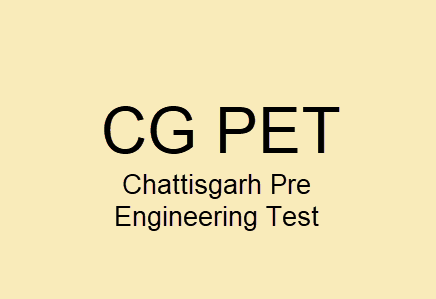Chhattisgarh Pre-Engineering Test (CGPET) is a state-level entrance exam conducted by the Chhattisgarh Professional Examination Board (CPEB) for admission into various undergraduate engineering courses in the state of Chhattisgarh. The exam is usually held in the month of May and is open to Indian nationals who meet the eligibility criteria. The CGPET exam consists of multiple-choice questions in Physics, Chemistry, and Mathematics, and candidates who qualify the exam are eligible for admission into various engineering colleges in Chhattisgarh based on their rank and performance in the exam.

CGPET Syllabus
The CGPET syllabus covers three subjects: Physics, Chemistry, and Mathematics. In Physics, topics such as units and dimensions, laws of motion, work, energy, and power, thermodynamics, oscillations and waves, electrostatics, magnetism, optics, atoms and nuclei, and electronic devices are included. In Chemistry, topics such as basic concepts, atomic structure, chemical bonding, chemical thermodynamics, solutions, equilibrium, redox reactions, surface chemistry, classification of elements, organic chemistry, biomolecules, and polymers are covered. In Mathematics, topics such as algebra, trigonometry, calculus, coordinate geometry, and statistics are included. It is important for candidates to be thorough with the complete syllabus, understand the basic concepts, and practice regularly to score well in the CGPET exam.
Important Topics & Weightage – Physics
Sure, here are some important topics and their weightage for Physics in CGPET:
Topic |
Weightage |
|---|---|
| Mechanics | 30-35% |
| Heat and Thermodynamics | 10-15% |
| Waves and Oscillations | 10-15% |
| Electrostatics and Magnetism | 20-25% |
| Optics | 10-15% |
| Modern Physics | 10-15% |
Note: The weightage of each topic may vary slightly from year to year. It is advisable to check the official CGPET syllabus for the latest updates.
Important Topics & Weightage – Chemistry
Here are some important topics and their weightage for Chemistry in CGPET:
Topic |
Weightage |
|---|---|
| Basic Concepts | 5-10% |
| States of Matter | 10-15% |
| Atomic Structure | 10-15% |
| Chemical Bonding and Molecular Structure | 10-15% |
| Chemical Thermodynamics | 10-15% |
| Solutions | 5-10% |
| Equilibrium | 10-15% |
| Redox Reactions and Electrochemistry | 5-10% |
| Chemical Kinetics | 5-10% |
| Surface Chemistry | 5-10% |
| Classification of Elements and Periodicity in Properties | 5-10% |
| Hydrogen | 5-10% |
| Alkali and Alkaline Earth Metals | 5-10% |
| Group 1 and Group 2 Elements | 5-10% |
| p-Block Elements | 10-15% |
| d- and f-Block Elements | 5-10% |
| Coordination Compounds | 5-10% |
| Environmental Chemistry | 5-10% |
| Organic Chemistry – Basic Principles and Techniques | 5-10% |
| Hydrocarbons | 5-10% |
| Haloalkanes and Haloarenes | 5-10% |
| Alcohols, Phenols, and Ethers | 5-10% |
| Aldehydes, Ketones, and Carboxylic Acids | 5-10% |
| Amines | 5-10% |
| Biomolecules | 5-10% |
| Polymers | 5-10% |
| Chemistry in Everyday Life | 5-10% |
Note: The weightage of each topic may vary slightly from year to year. It is advisable to check the official CGPET syllabus for the latest updates.
Important Topics & Weightage – Mathematics
Here are some important topics and their weightage for Mathematics in CGPET:
Topic | Weightage |
|---|---|
| Algebra | 25-30% |
| Trigonometry | 10-15% |
| Coordinate Geometry | 20-25% |
| Calculus | 25-30% |
| Probability and Statistics | 5-10% |
Note: The weightage of each topic may vary slightly from year to year. It is advisable to check the official CGPET syllabus for the latest updates.
CGPET Exam Pattern
The CGPET exam pattern includes three subjects: Physics, Chemistry, and Mathematics. The exam is conducted in offline mode and consists of 150 multiple choice questions (MCQs). The duration of the exam is 3 hours. The questions are of objective type, and each question carries 1 mark. There is no negative marking for wrong answers.
The distribution of questions for each subject is as follows:
Subject | Number of Questions |
|---|---|
| Physics | 50 |
| Chemistry | 50 |
| Mathematics | 50 |
To qualify for the CGPET exam, candidates are required to score a minimum of 33% marks in each subject and an aggregate of 45% marks in all three subjects. Candidates who meet the eligibility criteria and score above the cut-off marks are called for the counselling process.



















